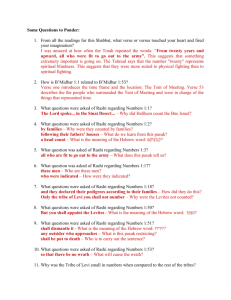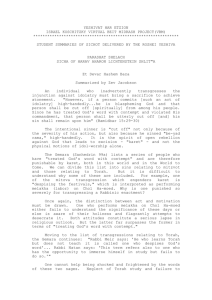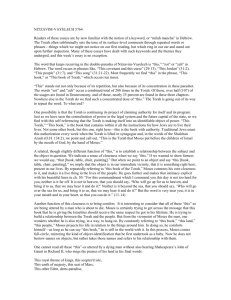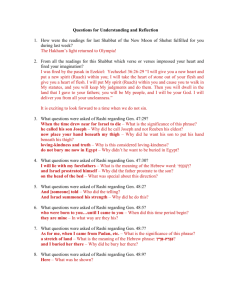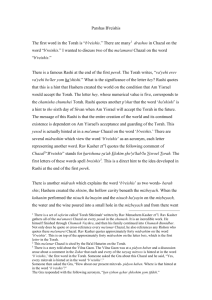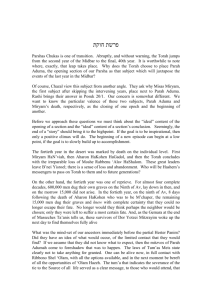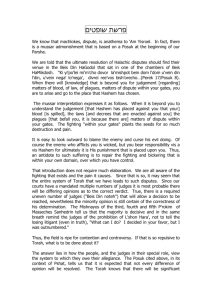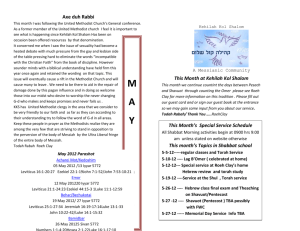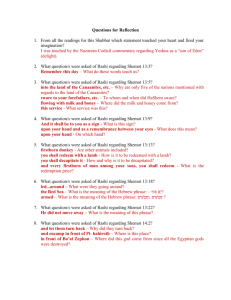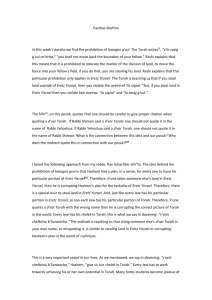Some Questions to Ponder: After diligently reading and studying the
advertisement
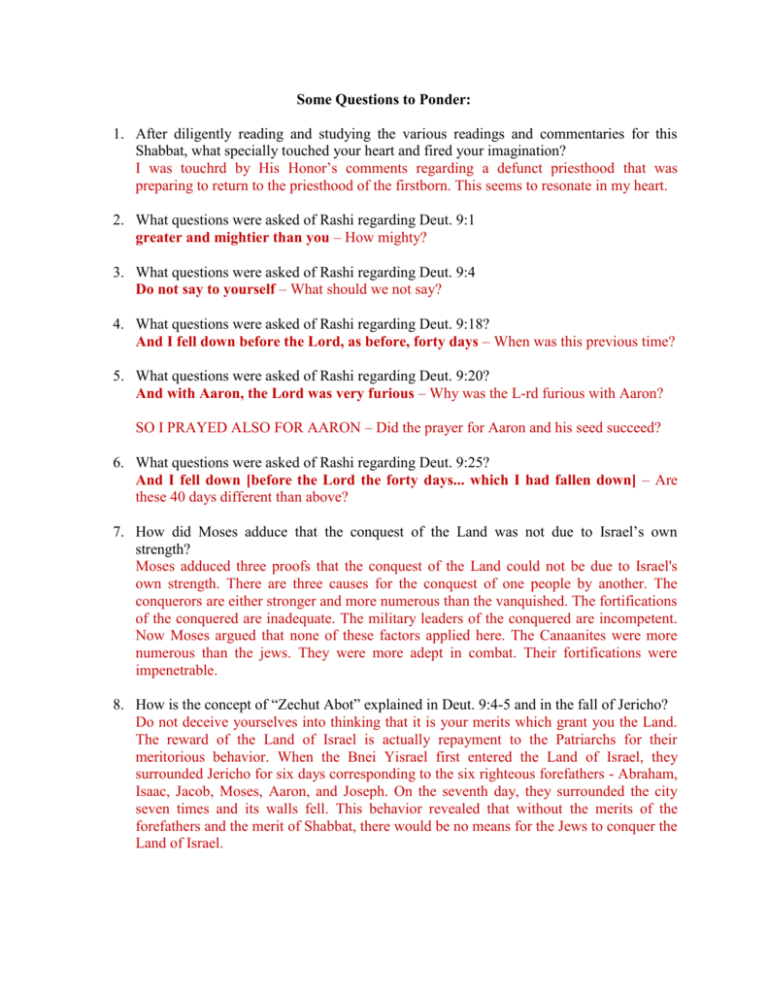
Some Questions to Ponder: 1. After diligently reading and studying the various readings and commentaries for this Shabbat, what specially touched your heart and fired your imagination? I was touchrd by His Honor’s comments regarding a defunct priesthood that was preparing to return to the priesthood of the firstborn. This seems to resonate in my heart. 2. What questions were asked of Rashi regarding Deut. 9:1 greater and mightier than you – How mighty? 3. What questions were asked of Rashi regarding Deut. 9:4 Do not say to yourself – What should we not say? 4. What questions were asked of Rashi regarding Deut. 9:18? And I fell down before the Lord, as before, forty days – When was this previous time? 5. What questions were asked of Rashi regarding Deut. 9:20? And with Aaron, the Lord was very furious – Why was the L-rd furious with Aaron? SO I PRAYED ALSO FOR AARON – Did the prayer for Aaron and his seed succeed? 6. What questions were asked of Rashi regarding Deut. 9:25? And I fell down [before the Lord the forty days... which I had fallen down] – Are these 40 days different than above? 7. How did Moses adduce that the conquest of the Land was not due to Israel’s own strength? Moses adduced three proofs that the conquest of the Land could not be due to Israel's own strength. There are three causes for the conquest of one people by another. The conquerors are either stronger and more numerous than the vanquished. The fortifications of the conquered are inadequate. The military leaders of the conquered are incompetent. Now Moses argued that none of these factors applied here. The Canaanites were more numerous than the jews. They were more adept in combat. Their fortifications were impenetrable. 8. How is the concept of “Zechut Abot” explained in Deut. 9:4-5 and in the fall of Jericho? Do not deceive yourselves into thinking that it is your merits which grant you the Land. The reward of the Land of Israel is actually repayment to the Patriarchs for their meritorious behavior. When the Bnei Yisrael first entered the Land of Israel, they surrounded Jericho for six days corresponding to the six righteous forefathers - Abraham, Isaac, Jacob, Moses, Aaron, and Joseph. On the seventh day, they surrounded the city seven times and its walls fell. This behavior revealed that without the merits of the forefathers and the merit of Shabbat, there would be no means for the Jews to conquer the Land of Israel. 9. How is the place called Horeb paradoxical? In the very place, Horeb, where the Jews were given the Torah, there they actually provoked God the most by erecting the Golden Calf. 10. What five sins were committed with the erection of the golden calf? 1. Israel denied God who had brought them out of Egypt and had performed all the great miracles which they witnessed. 2. They had been very ungrateful to Moses, who had suffered so much on their behalf and who had been eagerly awaiting this longed-for day of the Giving of the Torah. The sixth hour (noon) had arrived and Moses had not appeared. Bnei Yisrael did not wait at least until evening before building the idol. 3. They worshipped the calf. 4. They sacrificed offerings before it. 5. Usually when people sin, they repent at once, but Bnei Yisrael showed no sign of regret and they danced and sported before the Calf. This is the meaning of the words: "And when he drew near to the camp and he saw the calf and the dances." (Ex. 32:19) The making of the Calf was a terrible sin in itself, their rejoicing with it showed that they had not repented, making this a more grievous offense. 11. Why is Psalm 119 an important litmus test for anyone claiming to be a religious minister? The Psalm for this Shabbat (119:1-24) instructs us that a "true servant of G-d" must be the embodyment of both the Torah's commandments as well as the embodyment of the people under his care. If Psalm 119 is not the living characteristic of a Rabbi, Paqid, Priest or Pastor then that person has ceased to be a "servant of Ha-Shem" most blessed be He! 12. Why is the principle “Those are fittest to rule that have learnt to obey” so critical with regards to the body of Messiah? If we are not ourselves in subjection to a HaShem, then those under us will see our hypocrisy and will not obey us. 13. What in the Torah Seder this week fired the imagination of the Psalmist as he penned Psalm 119:1-24? The verbal tallies between this portion of Psalm 119 and the Torah are ‘HaShem’ and ‘said’. This Psalm waxes eloquently about the benefits of what ‘HaShem said’, in the Torah, as a guide for our lives. This Torah defines righteousness, the opposite of the wickedness of the inhabitants of Canaan that are to be destroyed in our Torah portion in v.4. Clearly our Torah portion shows the benefits of hearing and acting on what HaShem said. 14. What in the Torah Seder this week fired the imagination of the prophet in the Ashlamatah of Joshua 1:9-18? The word ‘servant’. 15. What in the Torah Seder, Psalm and Prophetic Lesson for this week fired the imagination of Hakham Tsefet as his scribe penned Mark 14:43-52? The Torah recalls the sin of the Golden calf and the rebellion of the people. This rebellion is paralleled in the High Priest by sending his armed servants to capture Yeshua. Likewise, it represents the attitude of unrepentant Yehuda Ish Keriyoth. The Praiseworthy of Psalm 119:1 refers to Yeshua who even in the midst of this terrible situation does not conduct himself inappropriately. The command to be strong and of good courage applies to Yeshua as he undergoes the calamity of the hour he wanted to pass in the previous pericope. 16. In your opinion what key message/s did Hakham Tsefet try to convey? Hakham Tsefet was trying to convey the hypocrisy of the existing priesthood and that it was fading away because it was not fulfilling its duties. 17. How has Judaism and the Jewish people become a Qorban (sacrifice)? By engaging in study and tzedaka. They are the keepers of the Torah and it has been assigned to them to take the Torah to the world. This makes them the Korbon. By their obedience in doing their job, the gentile will be “brought near” to God. 18. How should we interpret Genesis 22:18 in view of the Jewish Diaspora? And in thy seed shall all the nations of the earth be blessed; because thou hast obeyed my voice. Because of the diaspara, the knowledge of HaShem has been taken to the entire western world. As nations began following HaShem, they were blessed. We also see that the societal and technological innovations of the Jewish people have blessed the entire world in many ways. 19. According to Rashi’s comments of Joshua 1:2, during the one month period of mourning for Moses 3000 Halakhot were forgotten. What Tikkun was effected to compensate for this loss? (please refer to the text of Isaiah 42:21 in your answer) Martial activities that allow the Torah to be magnified and made honorable. By promotion of Torah and Torah study the laws that have been lost will be revealed and restored. 20. In your opinion, and taking into consideration all of the above readings for this Sabbath, what is the prophetic message for this week? We need to redouble our efforts at Torah study in order to stand against the trial that are coming our way. Somehow we have to become real servants of Mashiach. We need to embody the Mashiach. Be willing to do what it takes to fulfil the commission to teach the Gentiles. Study Torah, be obedient and submit yourself to be a servant under the Mighty Hand of God. It is G-d who is responsible for our victories, be and Ebed HaShem through Messiah.

